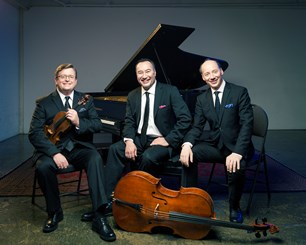September 21, 2019 – Montrose Trio
TWO CANADIAN SUPER-STARS RETURN TO THE VIRTUOSI STAGE IN THE MONTROSE TRIO!

Dear friends,
 The MONTROSE TRIO opens the 2019 season, as they did in 2017. The audience was thrilled with their performance two years ago and many asked us to bring them back.
The MONTROSE TRIO opens the 2019 season, as they did in 2017. The audience was thrilled with their performance two years ago and many asked us to bring them back.
Pianist Jon Kimura Parker and violinist Martin Beaver are like old friends to Winnipeg music-lovers. Martin was born and raised in Winnipeg and lived on Montrose Street. The MONTROSE TRIO is completed by the English cellist Clive Greensmith who also had anchored the TOKYO STRING QUARTET when it was led by Martin Beaver and performed on Virtuosi Concerts. This is a fabulous ensemble!
Here are a few of the comments collected in The Audience as Critic in 2017:
“One of the best Virtuosi Concerts EVER!”
“I am astounded at the artistry of the
musicians”
“A thrilling evening of classical music at its
very best!”
“OMG!!! Loved the encore of ‘O Canada’ in 60
seconds in the style of Haydn, Shostakovich
and Arensky.”
“What a stunning performance…a truly
memorable experience.”
I just returned from the Banff International String Quartet Competition where Martin served as a juror. Coincidentally, we bumped into each other when I arrived at Calgary airport. He told me that the TRIO had just booked their Winnipeg tickets and would arrive two days early on Thursday to ensure extra time for rehearsals.
The Montrose programme is one of truly “Epic Proportions”, and we have so entitled their concert. Here is their Artistic Vision for their programme which they sent to us recently: “Only six decades separate the composition of Schubert’s Trio in E-Flat major and Dvorak’s “Dumky” Trio but they present substantially diverse approaches to the form. Dvorak’s 4th trio, written in 1891, is episodic in nature, with a multi-movement construct surrounding presentations of the traditional melancholy “Dumka”. It is freeing for us as a trio to perform a work filled with such compelling melodic and rhythmic details, with our emotions in the foreground. By contrast, Schubert’s trio, written in 1827 near the end of his short life, occupies a traditional and very large 4-movement footprint, with its emotional content drawn in more subtle strokes. Its stately and beautiful slow movement has inspired filmmakers for several decades. Each work is a masterpiece, and it is a very special privilege to bring both to our return visit to Virtuosi Concerts.”
- Harry’s Background Notes below: Taken mostly from Chamber Music, by Melvin Berger.
Dvorak Piano Trio in E minor, Op. 90, “Dumky”: “Dumky” is the plural of “Dumka”. While Dvorak’s Bohemian/Czech nationalism seldom took the form of quoting actual folk song melodies, he frequently incorporated the traditional turns of melody and rhythmic patterns of Slavonic folk music. The Dumka was a popular folk form which originally referred to remembrances in verse or song of the lives and deeds of ancient heroes, expressed with a meditative and melancholic tone. It was also popular in the Ukraine. The folk influence, as filtered through his own musical imagination, can also be heard in the American echoes in the music he composed later while living in America (1892-95). The Dumky Trio was published in 1894 while he was still abroad. His trusted friend Johannes Brahms did the proofreading (and minor editing) on his behalf.
Schubert Piano Trio in E Flat Major, Op.100, D.929: This work was composed shortly after Schubert had paid a farewell visit to the gravely ill Beethoven and then attending his funeral in 1827 where he was given the honour of torchbearer. Only a few months later, it was the major work selected by him for the programme of an all-Schubert concert. The piece was held in special regard by the composer/critic Robert Schumann who said of it: “Some years ago, a trio by Schubert passed across the face of the musical world like some angry comet in the sky. It was his hundredth opus, and shortly afterward, in November 1828, he died.”
Young Artist Program
Christina Thanisch-Smith
Born in Fredericton and raised in Winnipeg, Christina Thanisch-Smith is currently completing her B.Mus (Voice Perf.) at the University of Manitoba under the tutelage of Monica Huisman. Feeling at home on the stage and with a passion for opera, Christina performed the role of Mariane in Kirke Mechem’s Tartuffe (Opera NUOVA, Canadian Premiere) and has sung excerpts of roles such as Susanna (Le nozze di Figaro) and Arminda (La Finta Giardinera) with U of M’s Opera Theatre. Christina had the opportunity of performing as a soloist with the WSO as the winner of their Rising Stars competition (2015) and won the Zita Bernstein Competition (2017). This year, she was one of two winners of the U of M’s Lawrence Genser Competition and runner-up for the Winnipeg Music Festival’s Rose Bowl. This summer, Christina returned to Opera NUOVA singing the role of Lily in The Secret Garden, where she was praised for her “exquisit and ethereal stage presence”, and participated in Wendy Nielsen’s Vocal Techniques Workshop. Her graduation recital is scheduled for March 2020.
Megan Dufrat
Pianist Megan Dufrat is a recent graduate of the Desautels Faculty of Music, where she was the recipient of the prestigious Graduate Student Scholarship, and James B. Hartman Scholarship. Megan has been a featured performer in festivals across Canada including the Opera NUOVA Summer festival in Edmonton, Alberta and the Tuckamore Chamber Music Festival in St. John’s, Newfoundland and collaborates with many ensembles and soloists in Winnipeg.
Enjoy this wonderful evening of beautiful music!



